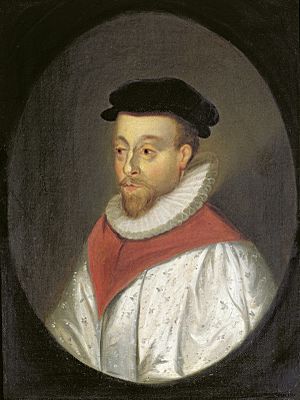This Is the Record of John facts for kids
Quick facts for kids "This Is the Record of John" |
|
|---|---|
| Verse anthem by Orlando Gibbons | |

Portrait of Orlando Gibbons
|
|
| Period | Tudor |
| Genre | Anglican church music |
| Form | Motet |
| Written | 1600s: England |
| Text | John 1:19-23 |
| Language | Early Modern English |
| Based on | Gospel of John |
"This Is the Record of John" is a special type of song called a verse anthem. It was written by a famous English composer named Orlando Gibbons (who lived from 1583 to 1625).
This song uses words from the Gospel of John in the Geneva Bible. It's a great example of Anglican church music from that time. The "John" mentioned in the song is John the Baptist.
The song has three main parts. Each part starts with a solo singer, usually a high male voice called a contratenor. After the solo, a full group of singers (a choir) joins in. They often repeat or echo the words from the solo part.
Singers are usually joined by an organ. Sometimes, a group of string instruments called a viol consort might play along. However, it's not certain how often viols were used in church services back then.
The Story Behind the Song
Why Was "This Is the Record of John" Written?
This special song was created because William Laud asked for it. He was in charge of St John's College, Oxford, from 1611 to 1621. This college is named after John the Baptist, which makes sense for the song's topic!
The song was written for the college's chapel. It was probably first performed there. The words of the song are often read during the Advent season in churches.
When Was the Song First Used?
The oldest copies of this song that we still have are from the 1630s. This was about ten years after Orlando Gibbons passed away. These old copies are found in important churches and cathedrals across England, even as far away as Durham.
This shows that the song was very popular and used widely when it was first written. Today, you can find "This Is the Record of John" in many modern music books, like the Oxford Book of Tudor Anthems.
 | George Robert Carruthers |
 | Patricia Bath |
 | Jan Ernst Matzeliger |
 | Alexander Miles |

